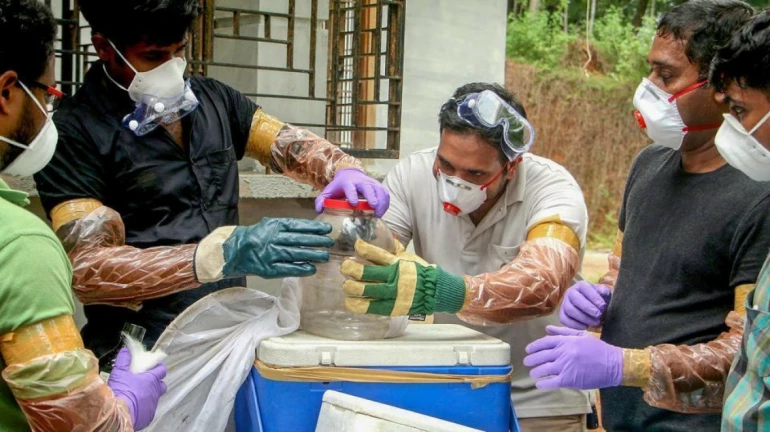
The health authorities in Maharashtra have issued an alert amid rising Nipah virus cases and fatalities in Kerala. The Maharashtra government’s health department is taking proactive measures to prevent the spread of the virus within the state.
The vigilance and preparedness efforts is aimed at swiftly identifying and containing any potential Nipah virus cases.
For this, the Public Health Department in Maharashtra has initiated a comprehensive survey of patients exhibiting symptoms akin to Acute Encephalitis Syndrome (AES). National Institute of Virology (NIV), Pune, can test throat, nasal, urine and blood samples by RTCPR.
The follows six cases of Nipah infection detected in Kerala, of which two have died and four are being treated.
Dr. Pratap Singh Saranikar, Joint Director of the Public Health Department, has issued directives to District Surgeons, District Health Officers, and Municipal Corporations to coordinate efforts in this regard. While the disease does not currently pose immediate threat in the state, it is essential for all health systems to be vigilant, officials further added.
Explaining further about the virus, Dr. Pavan Yadav, Lead Consultant - Interventional Pulmonology & Lung Transplantation, Aster RV Hospital shared that Nipah virus often abbreviated as NiV, is a zoonotic virus that can cause severe illness in humans. It was first identified in Malaysia in 1999 during an outbreak among pig farmers and subsequently in Singapore. Nipah Virus belongs to the family Paramyxoviridae, genus Henipavirus. RNA virus is known to cause Nipah virus infection, or Nipah Virus Disease (NiVD) in humans.
Transmission and Spread
· Nipah Virus primarily spreads through direct contact with infected bats, pigs, or contaminated materials, like their urine or saliva
· Human-to-human transmission is also possible through close contact with infected individuals, especially in healthcare settings
· Consuming fruits contaminated by bat saliva or urine can also lead to infection
At-Risk Population
· People in close contact with infected animals, especially those involved in the pig farming industry, are at higher risk
· Healthcare workers caring for NiV-infected patients are also at risk due to potential nosocomial transmission
· Communities living in regions with known NiV outbreaks face a higher risk
Precautions and Preventive Measures
· Strict hygiene measures should be followed when handling animals, particularly pigs and bats
· Avoid drinking raw date palm sap, which can be contaminated with the virus
· Isolation and appropriate infection control measures in healthcare settings are crucial
· Use of personal protective equipment (PPE) is essential for healthcare workers
· Public health authorities conduct contact tracing and isolation of suspected cases during outbreaks
Seriousness of the Disease:
· Infection can range from mild flu-like symptoms to severe encephalitis (inflammation of the brain), leading to a high mortality rate
· The seriousness of the disease depends on factors like the strain of the virus and the individual's immune response
· NiV outbreaks have led to fatalities in the past, making it a public health concern
· Known for its relatively high virulence, it has the potential to cause severe disease in infected individuals
Severity:
· The case fatality rate (CFR) can vary depending on the outbreak strain and the level of medical care available, but it has been reported to be as high as 70% in some outbreaks
· Severe cases often lead to respiratory distress and neurological complications, making it a highly concerning pathogen
Contagiousness
· Nipah virus is not as highly contagious as some other viruses like measles or the common cold
· In view of being less contagious the risk of Nipah spreading rapidly is lesser. The risk typically decreases with distance
Public Health Measures
· Stay informed about the situation by following updates from trusted health authorities like the World Health Organization (WHO) and the Indian Ministry of Health and Family Welfare
· Pay attention to any travel advisories or restrictions issued by local health authorities
Personal Precautions
· Encourage people in your community and healthcare colleagues to practice strict hygiene measures, especially if they have traveled to the affected area or have been in close contact with individuals who have been detected.
· Emphasise the importance of avoiding direct contact with animals, particularly bats and pigs, which are known reservoirs of the Nipah virus.
Healthcare Preparedness
· Proper isolation and infection control protocols are in place
· Advocate for healthcare workers to use appropriate personal protective equipment (PPE) when dealing with suspected cases.





